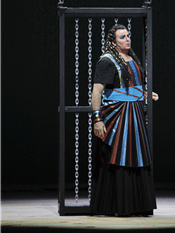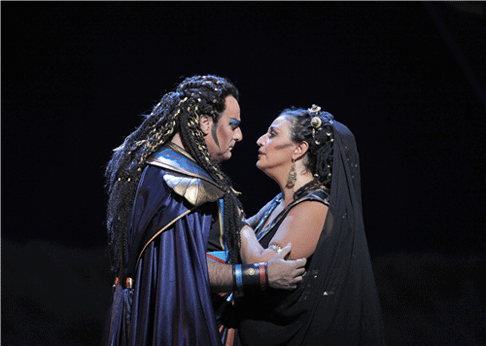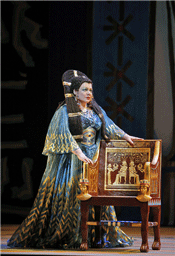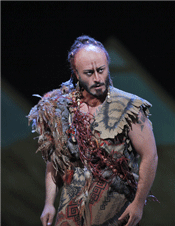![Micaela Carosi as Aida [Photo courtesy of San Francisco Opera]](http://www.operatoday.com/Carosi.gif)
21 Sep 2010
Aida in San Francisco
Opera as circus. The current San Francisco Aida comes from the English National Opera where an inspired and probably very excited administrator proposed a production by aging London fashionista Zandra Rhodes.
English Touring Opera are delighted to announce a season of lyric monodramas to tour nationally from October to December. The season features music for solo singer and piano by Argento, Britten, Tippett and Shostakovich with a bold and inventive approach to making opera during social distancing.
This tenth of ten Live from London concerts was in fact a recorded live performance from California. It was no less enjoyable for that, and it was also uplifting to learn that this wasn’t in fact the ‘last’ LfL event that we will be able to enjoy, courtesy of VOCES8 and their fellow vocal ensembles (more below …).
Ever since Wigmore Hall announced their superb series of autumn concerts, all streamed live and available free of charge, I’d been looking forward to this song recital by Ian Bostridge and Imogen Cooper.
The Sixteen continues its exploration of Henry Purcell’s Welcome Songs for Charles II. As with Robert King’s pioneering Purcell series begun over thirty years ago for Hyperion, Harry Christophers is recording two Welcome Songs per disc.
Although Stile Antico’s programme article for their Live from London recital introduced their selection from the many treasures of the English Renaissance in the context of the theological debates and upheavals of the Tudor and Elizabethan years, their performance was more evocative of private chamber music than of public liturgy.
In February this year, Albanian soprano Ermonela Jaho made a highly lauded debut recital at Wigmore Hall - a concert which both celebrated Opera Rara’s 50th anniversary and honoured the career of the Italian soprano Rosina Storchio (1872-1945), the star of verismo who created the title roles in Leoncavallo’s La bohème and Zazà, Mascagni’s Lodoletta and Puccini’s Madama Butterfly.
Evidently, face masks don’t stifle appreciative “Bravo!”s. And, reducing audience numbers doesn’t lower the volume of such acclamations. For, the audience at Wigmore Hall gave soprano Elizabeth Llewellyn and pianist Simon Lepper a greatly deserved warm reception and hearty response following this lunchtime recital of late-Romantic song.
Collapsology. Or, perhaps we should use the French word ‘Collapsologie’ because this is a transdisciplinary idea pretty much advocated by a series of French theorists - and apparently, mostly French theorists. It in essence focuses on the imminent collapse of modern society and all its layers - a series of escalating crises on a global scale: environmental, economic, geopolitical, governmental; the list is extensive.
For this week’s Live from London vocal recital we moved from the home of VOCES8, St Anne and St Agnes in the City of London, to Kings Place, where The Sixteen - who have been associate artists at the venue for some time - presented a programme of music and words bound together by the theme of ‘reflection’.
'Such is your divine Disposation that both you excellently understand, and royally entertaine the Exercise of Musicke.’
Amongst an avalanche of new Mahler recordings appearing at the moment (Das Lied von der Erde seems to be the most favoured, with three) this 1991 Mahler Second from the 2nd Kassel MahlerFest is one of the more interesting releases.
‘And there was war in heaven: Michael and his angels fought against the dragon; and the dragon fought and his angels, And prevailed not; neither was their place found any more in heaven … that old serpent … Satan, which deceiveth the whole world: he was cast out into the earth, and his angels were cast out with him.’
If there is one myth, it seems believed by some people today, that probably needs shattering it is that post-war recordings or performances of Wagner operas were always of exceptional quality. This 1949 Hamburg Tristan und Isolde is one of those recordings - though quite who is to blame for its many problems takes quite some unearthing.
There was never any doubt that the fifth of the twelve Met Stars Live in Concert broadcasts was going to be a palpably intense and vivid event, as well as a musically stunning and theatrically enervating experience.
‘Love’ was the theme for this Live from London performance by Apollo5. Given the complexity and diversity of that human emotion, and Apollo5’s reputation for versatility and diverse repertoire, ranging from Renaissance choral music to jazz, from contemporary classical works to popular song, it was no surprise that their programme spanned 500 years and several musical styles.
The Academy of St Martin in the Fields have titled their autumn series of eight concerts - which are taking place at 5pm and 7.30pm on two Saturdays each month at their home venue in Trafalgar Square, and being filmed for streaming the following Thursday - ‘re:connect’.
The London Symphony Orchestra opened their Autumn 2020 season with a homage to Oliver Knussen, who died at the age of 66 in July 2018. The programme traced a national musical lineage through the twentieth century, from Britten to Knussen, on to Mark-Anthony Turnage, and entwining the LSO and Rattle too.
With the Live from London digital vocal festival entering the second half of the series, the festival’s host, VOCES8, returned to their home at St Annes and St Agnes in the City of London to present a sequence of ‘Choral Dances’ - vocal music inspired by dance, embracing diverse genres from the Renaissance madrigal to swing jazz.
Just a few unison string wriggles from the opening of Mozart’s overture to Le nozze di Figaro are enough to make any opera-lover perch on the edge of their seat, in excited anticipation of the drama in music to come, so there could be no other curtain-raiser for this Gala Concert at the Royal Opera House, the latest instalment from ‘their House’ to ‘our houses’.
"Before the ending of the day, creator of all things, we pray that, with your accustomed mercy, you may watch over us."
![Micaela Carosi as Aida [Photo courtesy of San Francisco Opera]](http://www.operatoday.com/Carosi.gif)
Opera as circus. The current San Francisco Aida comes from the English National Opera where an inspired and probably very excited administrator proposed a production by aging London fashionista Zandra Rhodes.
The program booklet credits include her various hair colors (“bright green later changed to a spectacular pink, sometimes radiant red”). Mme. Zandra, approximately 70 years of age according to the program booklet, was aided by British stage director Jo Davis whose credits include Chitty Chitty Bang Bang in the West End.
 Marcello Giordani as Radames
Marcello Giordani as Radames
These ladies are nothing if not clever. They dealt with Verdi’s problematic three-ringer in a very business like fashion (among Mme. Rhodes listed credits is her successful retail outlet in fashionable Fulham Road). More often than not Verdi’s delicate masterpiece is crushed by its own weight (six big singers working out a sordid political mess caused by some runaway passions and a great big military victory, the situation finally resolved by sheer fatigue — that of the lovers themselves and invariably of the audience too).
The fatigue factor was very nearly solved by mesdames Rhodes and Davis who kept things moving right along by a pyramid shape that expanded and contracted according to moods and situations (the shutters closed completely, finally, on the dying lovers). Sometimes one of the triangle of lovers was left alone on the apron against blank, dark scenery to tell us a few things in private, and once the stage was opened up totally in blank white in stark contrast to the bright greens, spectacular pinks and radiant reds of an unusually flamboyant, 1960’s sensibility Egypt.
All this slick theatricality was unfettered by concept save the presence of the wrathful eye of Horus that oversaw much of the action and cleverly doubled as decoration too. The lower portion of Horus’ priests were covered by wide gold lamé skirts leaving the priests naked from the waist up (and that was a sight to see), coiffed by the appropriate falcon headdress. The Ethiopians and particularly Aida’s father Amonasro were spectacularly savage à la American indian or maybe Australian aboriginal, comically light years away from tall, proud, black Ethiopians who might have seemed actually threatening.
 Marcello Giordani as Radames and Micaela Carosi as Aida
Marcello Giordani as Radames and Micaela Carosi as Aida
All this was overseen by San Francisco Opera’s extraordinary music director, Nicola Luisotti who probably saw nothing of the above having maneuvered his singers out onto the stage apron where alone, in pairs, trios, etc., he vindicated the idea of the traditional Italian “numbers” opera and reinvented the idea of the “costume” opera (characters are identified by their costumes rather than by what they do). This positioning was ideal for Mo. Luisotti to commune with Verdi and with great big voices, and to create as much effect as possible. Suffice to say that the effect was in fact very nearly maximum, held back only by the fuzzy acoustic of the War Memorial Opera House.
So it was a great evening that teased critical sensibility, seamlessly morphing in and out of tongue-in-cheek caricature of spectacle opera to just plain big, thrilling opera like opera once was, or so we are told.
 Dolora Zajick as Amneris
Dolora Zajick as Amneris
Diva Dolora Zajick spat and soared in fine voice as Amneris, upholding her by now very long held reputation as the Amneris of our day. She was in ideal concert with the big musical and vocal ideas of the maestro and perfectly at home in the costume opera concept (a big blue dress with a huge sphinx like headdress). Mme. Zajick in fact and against all odds almost succeeded in making Amneris a living, feeling character, this achievement the magic of a true artist.
Likewise tenor Marcello Giordani and soprano Micaela Carosi, the ill-fated lovers, held their own with the maestro, Mr. Giordani bravely donning a truly ridiculous, unflattering warrior skirt while traversing the tenorial tessitura with ease and stylistic aplomb. Mme. Carosi soared to some beautiful pianissimos in the upper-most soprano registers, often the undoing of lesser singers, and otherwise exploited all Italianate mannerisms with conviction. Neither Mme. Carosi nor Mr. Giordani approached the vulnerability or sympathy of their characters, leaving the stage to Mme. Zajick.
 Marco Vratogna as Amonasro
Marco Vratogna as Amonasro
Baritone Marco Vratogna was puzzling as Amonasro. In his peculiar way-over-the-top costume he was inherently silly, and he delivered his role in a complementary fashion. He proved himself an excellent artist last season as Iago, thus the question remains whether he was directed into this strange histrionic performance or if he came up with it himself. The King of Egypt and the priest Ramfis were well sung respectively by Christian Van Horn and Hao Jiang Tian and were less controversial.
No account of an Aida production can avoid the triumphal scene. It moved quickly thanks to Mo. Luisotti and the mesdames Rhodes and Davis. They went for pure circus, complete with acrobats, a family dancing act and even the de rigueur elephant, here a whimsical, gossamer blue concoction that crowned the wit and fun of these clever ladies. The usual hundreds of supernumeraries had been reduced to a mere thirty-three, and there were no cuts. The scene flew by.
Michael Milenski